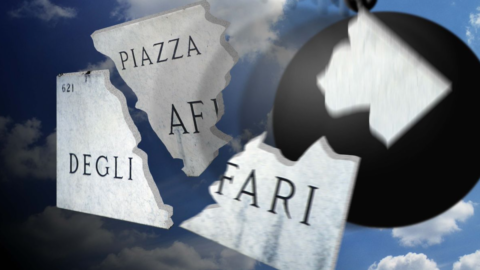SURPRISE: ITALY FINDS SECOND IN CLASS
BUT THE UNKNOWN OIL WEIGHTS. BENETTON LEAVES
The markets reopen their doors with great news: Italy second in the class immediately after Germany. The numbers back up the claim. The most obvious one concerns stock market prices: the Milanese FtseMib index recorded a 2,5% rise during the week, which brings the gain since the beginning of the year to 12,1%. Since January, the rally of banks has even exceeded 50%. The gap between the Italian square and the rest of Europe is thus widening. During the week the other European stock exchanges gained, but much less: the overall European Stoxx 600 index rose by 0,9% and the increase since the beginning of the year is 9,3%.
At the origin of this exploit there is, of course, the rally in government bonds: the yield on the ten-year BTP has further improved, falling to 4,87% from 4,92% the previous evening and has thus caught up with the Spanish Bono ( 4,86%). The spread with the Bund is at 308 points, from 305 yesterday evening. Similar movement for the two-year BTP: the yield fell to 1,66%, the Spanish Bono yields 2,14%.
The boom finds a convincing explanation at the European level: on Friday morning in Brussels 25 EU heads of state and government signed the new fiscal discipline pact strongly desired by Germany as an indispensable precondition for continuing to provide aid to countries in financial difficulty. But the historic signing was accompanied by two bad news for the German custodians of budgetary orthodoxy: faithful Holland, the armed wing of the Bundesbank's intransigence, denounces a deficit/GDP ratio of 4,5%, i.e. far from 50%. from the 3% bar, a precondition for being able to aim for a balanced budget. Worse still, Mariano Rajoy's Spain showed up without having done its homework: Madrid has announced that in 2012 the ratio will rise to 5,8% from its previous target of 4,4%. At this point, the only diligent student, in form and results, is reprobate Italy which closes at -3,9%, better than expected.
Unfortunately, in this almost serene atmosphere, a revolutionary novelty for our home price list, today we are celebrating an almost certain farewell: the delisting of the Benetton group gets underway. From today until March 30, Edizione Holding will offer 4,6 euros (with dividend included) to group shareholders. The operation, which marks an objective of depleting the list, concerns 25,15% of the share capital.
We start again after an electoral Sunday in distant areas which, however, could also have some significance on Western price lists. Including Italy. The success of the Tehran hawks, led by Ali Khamenei, was actually widely expected. Indeed, it would be a surprise if at the end of the ballot the outgoing president Ahmadinejad managed to drag his rival to the runoff. The conservative turn in Iran, however, does not bode well for crude oil prices, already under severe tension last week. In reality, what supported the price of Brent (which reached a record price of 128,40 dollars a barrel during the week) was the news, later denied, of damage to Saudi oil pipelines which would have forced Aramco to reduce crude oil deliveries. But this too is confirmation of the fragility of the crude oil market at the start of spring. At least as far as Europe is concerned.
Even the second "election" news touches, in some way, the energy chessboard. In Russia, as expected, Putin, the only important friend of former prime minister Silvio Berlusconi, wins the presidential elections in the first round and returns to the Kremlin: with 99% of the polled seats he obtained over 63,7% of the votes , therefore without the need for a ballot. A circumstance that could weigh on the future of South Stream, the gas pipeline through Turkey so dear to Gazprom (Putin's almost family business) but which Washington and even the EU do not like at all (which pitted it against the Nabucco hypothesis). The orientation of Italian diplomacy is today much more detached from the gas pipeline, in which Eni could reduce its stake to 20%.
Much will depend on the solution that the government chooses for the separation between Snam and Eni, one of the hottest topics. It is no mystery that Eni would like to sell its shareholding on the market, collecting the expected 3-4 billion, in the medium term. On the contrary, Minister Vittorio Grilli has now decided to proceed via a demerger and transfer of the share to the CDP, which would have more advantages: reduce the times of the operation; ensure public scrutiny after the stew; avoid any outlay of money. This solution is also appreciated by Eric Knuhgt, activist manager of Knight Vinke, who has been engaged for years in a personal campaign for separation, the first step for a six-legged dog less involved in regulated activities (and therefore less tied to politics), less in debt (with the separation, approximately 11 billion of debts will follow Snam) and more focused on the mission of the production of crude oil. Not an easy decision, hopefully a quick one.
In the oil sector, the week closed in a contrasting manner: Tenaris rose +3,5%, Saipem unchanged, Eni -0,5%. Enel stable +0,3% despite the promotion of European utilities decreed by Goldman Sachs after the ECB auction, an event considered favorable for debtors.
Meanwhile, there is curiosity about the market's reaction to the gigantic agreement signed by BP with the representatives of tens of thousands of those affected by the Gulf of Mexico disaster. BP, in order to stop the proceedings that should have begun today in New Orleans, has agreed to pay the sum of 7,8 billion dollars by way of reparation. But, according to many observers, the Louisiana judge may not agree to this "friendly" conciliation judged too bland.
Week of fire for the financials of our house. On the Fonsai front, the event of the week is the March 8 deadline, the last date for the Premafin board of directors to adhere to the Sator/Palladio offer. No seems obvious, but it could trigger a series of potentially very dangerous legal conflicts for the process of the four-way merger between Unipol, Fonsai, Premafin and Milano Assicurazioni. After all, Premafin's creditor banks also raised serious doubts about the holding company's recovery plan as proposed by the advisor Leonardo & Co. Both Unipol -1,3% and FondiariaSai -3 went down in Friday's session % and MilanoAssicurazioni -3,8%. After Thursday's crash, only Premafin +0,2 reacts. The clash between the Fondiaria house, in addition to the recovery of the value of the Btp in the portfolio, is giving Generali + 3,1% a spring flowering that has not been seen for some time. Meanwhile, Goldman Sachs is blessing the spring of European banks, starting with the Italian ones. The banking sector (like the utilities) goes from neutral to overweight: thanks to the strong benefits generated by the liquidity injection created by the ECB with the two maxi tap auctions.
Piazza Affari has certainly anticipated the judgment. In the ranking of the most popular stocks of the week, the banking sector dominates. In the lead is Banco Popolare +12, followed by Azimut +11,8%, Banca Popolare dell'Emilia-Romagna +8,4%, Mediolanum +7,9% and MontePaschi +7,8%. One wonders if the Toro intonation will hold up despite the controversies following the bill that resets the commissions on credit lines which caused Giuseppe Mussari's resignation from the ABI. In truth, the market has no doubts: the banking lobby will be able to deal with the threat.





